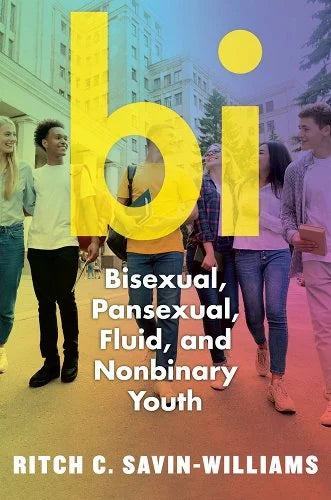Bi: Bisexual, Pansexual, Fluid, and Nonbinary Youth
Bi: Bisexual, Pansexual, Fluid, and Nonbinary Youth
Couldn't load pickup availability
Bi
Bisexual, Pansexual, Fluid, and Nonbinary Youth
Ritch C. Savin-Williams
New York University Press, 2021
ISBN 9781479825875
Softcover, 256 pp.
8.9 X 6.0 X 0.9 inches | 1.0 pounds
What bisexual youth can tell us about today's gender and sexual identities
Despite the increasing visibility of LGBTQ people in American culture, our understanding of bisexuality remains superficial, at best. Yet, five times as many people identify as bisexual than as gay or lesbian, and as much as 25 percent of the population is estimated to be bisexual. In Bi, noted scholar of youth sexuality, Ritch Savin-Williams, brings bisexuality to centerstage at a moment when Gen Z and millennial youth and young adults are increasingly rejecting traditional labels altogether. Drawing on interviews with bisexual youth from a range of racial, ethnic, and social class groups, he reveals to us how bisexuals define their own sexual orientation and experiences--in their own words. Savin-Williams shows how and why people might identify as bisexual as a result of their biology or upbringing; as a bridge or transition to something else; as a consequence of their curiosity; or for a range of other equally valid reasons.
With an understanding that sexuality and romantic attachments are often influx, Savin-Williams offers us a way to think about bisexuality as part of a continuum. He shows that many of the young people who identify as bisexual often defy traditional views, dispute false notions, and reimagine sexuality with regard to both practice and identity. Broadly speaking, he shows that many young people experience a complex, nuanced existence with multiple sexual and romantic attractions as well as gender expressions, which are seldom static but fluctuate over their lives.
Savin-Williams provides an important new understanding of bisexuality as an orientation, behavior, and identity. Bi shows us that bisexuality is seen and embraced as a valid sexual identity more than ever before, giving us timely and much-needed insight into the complex, fascinating experiences of bisexual youth themselves.
Share

